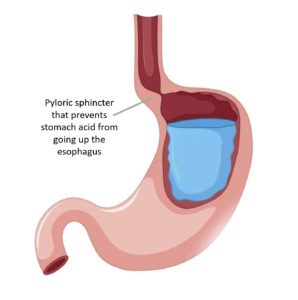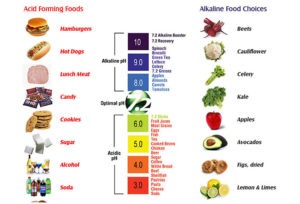
The term sour breath refers to foul breath caused by mouth acids. These mouth acids are caused by gastroesophageal reflux disease or GERD, bacteria in the mouth, or some other general health issue.
There are many recommendations for fixing sour breath but many people don’t know them. Are you afraid to stand too close to people when you speak for fear that they may smell your breath? Have you tried every dental hygiene product on the market, but still can’t get rid of it? While everyone deals with mouth odor once in a while, the cases that don’t go away are usually hiding something more sinister underneath. In such cases, the only way to keep smelly breath away for good is to address the issue that’s causing it. With these few tips, you can determine if your sour breath is a symptom of poor hygiene, or if you need to talk to your doctor or dentist.

The pyloric sphincter is a muscular valve between the esophagus and the stomach. Acid reflux occurs when this valve fails to keep stomach acids and food from burping up into the mouth.
Sour breath caused by GERD
GERD is a disorder caused by the weakening of the muscular sphincter at the junction between the esophagus and the stomach. This sphincter normally tightens to prevent stomach acid from going up the esophagus. When this sphincter doesn’t work, symptoms commonly called heartburn start. These symptoms may include:
- sour breath
- sore throat from acid reflux
- heartburn – burning sensation in chest or throat
- difficulty swallowing or feeling of phlegm buildup
- post nasal drip
- acid eroded teeth
- frequent chest colds
- burping up stomach acids and sometimes food
Treating GERD reduces the acids affecting your breath
Sleeping on an incline and losing weight are the two simplest ways to lessen the side effects of GERD. When looking for natural remedies, be careful not to choose things that will increase mouth acid production. Both honey and milk are frequently suggested for heartburn but will only increase the plaque acids that lead to bad breath.

There are many foods that help neutralize the acidity of the stomach. Other food selections that will help are bananas, yogurt, beans, melons, and green veggies such as sprouts, kale, and spinach.
Changes in eating habits and choices
Making food selections that are less acidic or cause the stomach to produce less acid will help. Wine, coffee, fruit juices, and sodas are popular drinks to limit. French fries, potato chips, fried chicken, and pancakes are on the naughty list. Eating several hours before you go to sleep will give time for your stomach to empty. Alkaline waters may be of some help. The higher pH of these waters may counteract the low stomach acids.
Medicines for GERD
- OTC antacids such as Maalox, Tums, Mylanta, and Rolaids
- Prilosec and generic proton pump inhibitors
Could upping your oral hygiene fix your sour breath?
If you think that the problem is due to poor dental hygiene, there are treatments available. Of course, your treatment will depend on your specific circumstances. Your dentist may recommend a number of treatments, which could include:
Improve your home hygiene: If your breath smells
Sometimes it really is that simple. If you’ve been neglecting your oral health, some improvements can make a world of difference. Brush your tongue, teeth, and gums to remove the bacteria that cause sour breath odor. Much like keeping your smile bright, making sure your mouth is pleasant requires that you maintain a good dental hygiene routine. Brush your teeth and floss at least twice a day.
Scrubbing your tongue with your toothbrush or a tongue scraper can help you eliminate the oral bacteria responsible for halitosis. Drinking a glass of water after eating helps to wash away food particles.
Often a dental prophylaxis will fix your sour breath:
Morning breath often occurs when you wait too long between regular dental cleanings. A cleaning with your hygienist can eliminate the problem.
Scaling and root planing:
Persistent odors that quickly return after brushing and flossing may be due to gum disease. When bacteria is too far beneath the gum, it cannot be reached with a toothbrush or floss. In these cases, your need a deep cleaning.
Periodontal therapy:
Some cases of gum disease are too severe to be treated with scaling and root planing. If mouth odors are due to gum disease, Dr. Fondriest will likely refer you to a trusted periodontist.
Fix sour breath with restorative dentistry:
Oftentimes, morning mouth is due to tooth decay. It’s important to address this problem as soon as possible, so you don’t compromise the health of your other teeth. Your dentist can gently remove the decay and restore the affected tooth with a filling, crown, or other restoration.
Fluoride treatments:
If you’re prone to decay, fluoride treatments can be successful in the fight against cavities and mouth odors.
Tips for Better Smelling Mouth
If your morning breath seems to last all day, try brushing and flossing before breakfast. When you sleep, your saliva production is drastically reduced, allowing bacteria to proliferate more than at any other time during the day. Eating stimulates your saliva production, helping you rinse away the germs that have gathered overnight and leave their odorous impression in your mouth.
Mouth rinses will help fix sour breath
If you don’t already, incorporate antibacterial mouthwash into your hygiene routine for additional power against oral bacteria. You can also gargle with hydrogen peroxide, whose oxygen content helps eliminate anaerobic (oxygen-less) bacteria in your mouth.
Xylitol based sugarless gum
Chew sugarless gum or mints with xylitol if you have dry mouth. This will stimulate the salivary glands and increase saliva flow and the xylitol has antibacterial qualities. this will temporarily improve your tainted breath. After the mint or gum is gone, the stench of these foods can remain until they’ve passed on their own.
Lifestyle and habit changes will help your breath
You can help fix your mouth odors just by drinking more water. Eat your fruits and vegetables that will give you the antioxidants to fight gum infections. Don’t use tobacco products. Stay away from spicy foods that have curry, onions, or garlic in them.
Confirm that your foul breath isn’t caused by a medical condition
Many health problems can cause halitosis. Cancer, tonsil infections, sinus problems, diabetes, kidney issues, postnasal drip, and some blood disorders. Medications frequently cause lower saliva flow.
Learn More About Fixing Sour Breath
If you think that your mouth odors are due to medical issues you should seek advice from your doctor. If your mouth odors still don’t go away, then visit your dentist to determine what’s causing it, and how you can rid yourself of it for good. To learn more, schedule a consultation by calling Lake Forest Dental Arts in Lake Forest, IL, at 847-234-0517. We also proudly serve residents of Chicago and all surrounding communities.
